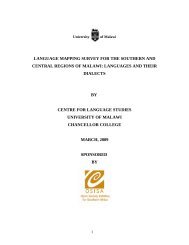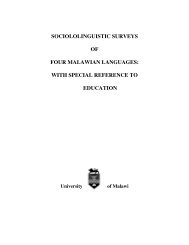languages and area spoken for chitipa - Centre for Language Studies
languages and area spoken for chitipa - Centre for Language Studies
languages and area spoken for chitipa - Centre for Language Studies
Create successful ePaper yourself
Turn your PDF publications into a flip-book with our unique Google optimized e-Paper software.
Chitipa, Citonga in Nkhata Bay, Kyangonde/Cinkhonde in Karonga may be used<br />
depending on whether the service deliverers themselves can speak the <strong>languages</strong> of their<br />
clients or not. While a language of a few family members or a few migrants or a minority<br />
group is <strong>spoken</strong> through out in private domains such as homes <strong>and</strong> where the speakers of<br />
the same language meet, in public places generally a language of wider communication is<br />
used <strong>for</strong> communication. For instance, most trading centers consist of multiple <strong>languages</strong>,<br />
with various traders <strong>and</strong> buyers bringing in their own <strong>languages</strong>. In Chitipa where several<br />
<strong>languages</strong> are similar, they either have to speak their own language or speak the language<br />
of the majority, which in most cases are Cilambya <strong>and</strong> Citumbuka. Those that can neither<br />
speak Citumbuka nor Cilambya simply have to stick to their own <strong>languages</strong>, e.g<br />
Kiswahili, Ciyawo, Chichewa <strong>and</strong> Cibemba.<br />
In Rumphi <strong>and</strong> Mzimba, most minority <strong>languages</strong> e.g Ciyawo, Chichewa, Cilambya, <strong>and</strong><br />
Cinkhonde are likely to be found at trading centers <strong>and</strong> in tobacco estates <strong>spoken</strong> by the<br />
estate tenants who are from the southern <strong>and</strong> central regions. Cingoni is usually <strong>spoken</strong> at<br />
home by a few elderly individuals in some <strong>area</strong>s of T.A. Mpherembe. In Karonga, the<br />
youth are proud to speak Cinkhonde at home, i.e., at the village, but are ashamed of it<br />
when they go to other places e.g. Blantyre, Mzuzu <strong>and</strong> Lilongwe. Some youths from<br />
Karonga claimed that they speak Chichewa away from home even when they leave home<br />
together because they are laughed at <strong>and</strong> mocked, being called achinasibweni (sibweni is<br />
a Tumbuka term <strong>for</strong> uncle).<br />
In Chitipa, pupils <strong>and</strong> teachers predominantly use a local language of the <strong>area</strong> <strong>for</strong><br />
learning <strong>and</strong> communicating on a daily basis. Citumbuka <strong>and</strong> Chichewa are very<br />
common in school environments in Nkhata Bay, Karonga <strong>and</strong> Chitipa districts especially<br />
in <strong>area</strong>s where Citumbuka is not commonly <strong>spoken</strong>. In secondary schools, according to<br />
some in<strong>for</strong>mants, girls prefer to use English <strong>and</strong> Chichewa to their own local <strong>languages</strong><br />
unlike boys who may stick to their mother tongues. In st<strong>and</strong>ards 1-4, in most parts of the<br />
region, Citumbuka is actually used as a medium of instruction despite the fact that there<br />
are no teaching materials written in this language. Interestingly enough, this is against<br />
government policy which states that Chichewa should be the only medium of instruction<br />
all over the country. In order to avoid the wrath of the ministry, the teachers have<br />
rationalized this practice by claiming that they switch to Citumbuka in order to help the<br />
pupils who are not conversant with Chichewa.<br />
Sometimes speakers of certain <strong>languages</strong> shift to other <strong>languages</strong> upon discovering that<br />
those <strong>languages</strong> are from their places of origin. For instance, in Karonga those from<br />
Chitipa meeting there shift to <strong>languages</strong> such as Cindali or Cisukwa to identify with each<br />
other. This was also reported to be the case among Citonga speakers when they meet in<br />
places like Mzuzu <strong>and</strong> other places. The speakers of Citumbuka are well known <strong>for</strong> the<br />
solidality element in language choice all over the country. Some respondents in Nkhata<br />
Bay confessed that sometimes they speak Citonga to sideline some members from the<br />
conversation especially when they know that their friends do not know Citonga.<br />
Availability of literature <strong>and</strong> knowledge of the local language in question determines the<br />
<strong>languages</strong> to be used in the churches. In Chitipa, at the Church of Central Africa<br />
21





